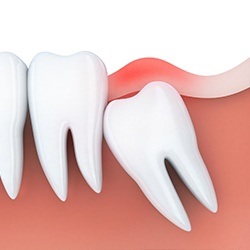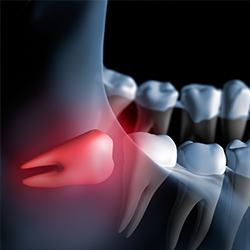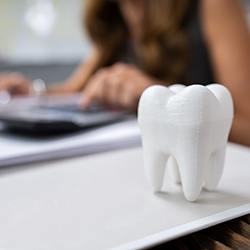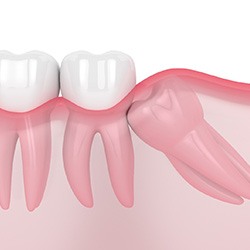Wisdom Teeth Extraction - Waco, TX
Comfortable Removals for Healthier, Happier Smiles

Sometimes, having a tooth removed is necessary to protect your oral and overall health. One of the most common types of tooth extraction is that of the wisdom teeth. In fact, this procedure is so frequently needed that it is often considered as something of a rite of passage for older teens. At Heart of Texas Smiles, we offer this procedure with extreme comfort and efficiency. Keep reading to learn more about how it works, and what you can expect from wisdom teeth extraction in Waco.
What Are the Wisdom Teeth?

The wisdom teeth are a set of “extra” molars that may start to erupt, or come through the gums, starting in the late teen years. We say these teeth are “extra” because they are not necessary for proper oral form and function. In fact, if they are present in the jaw, the wisdom teeth often end up causing more trouble than anything else. If there is not enough space in the gum line, the molars may become impacted, or stuck. Infection is likely to occur as well.
More often than not, wisdom teeth will need to be removed. Some of the symptoms of problematic wisdom teeth include:
- An ache in the back of the jaw
- A foul odor emerging from the back of the jaw
- Visibly erupted wisdom teeth
- Swelling, redness, or pus emerging from the back of the jaw
- Difficulty opening the mouth wide
- Ear, neck, or head pain
How Does the Procedure Work?

Wisdom tooth extraction takes place over the course of one visit to our office. We will schedule the surgery at a time that is most convenient for you or your child to ensure that you will have plenty of time to rest after the procedure. First, we administer the local anesthesia and sedation as desired for additional relaxation (more on that below). Once you are completely comfortable, Dr. Lassetter or Dr. Rivacoba will open the gum line and remove any bone that may be trapping the tooth. Then, the tooth is taken out in several pieces. After the tooth has been completely removed, the gum is closed with sutures and healing begins.
How We Keep You Comfortable

You don’t have to worry about being uncomfortable throughout the wisdom teeth removal. We will ensure that you are completely relaxed using local anesthesia, which numbs the treatment area. Sedation is available in pill form -- simply pop the prescribed medication about a half hour before the treatment and you will be feeling totally relaxed by the time you are settling into the dental chair! We will continually monitor your comfort levels throughout the procedure to ensure you remain relaxed.
Understanding the Cost of Wisdom Tooth Extractions

Do you need to schedule wisdom teeth extraction in Waco? Before doing so, you may wonder how much the procedure will cost. Since every case is unique, the overall price can vary significantly based on several factors. Generally, the range for these extractions can be anywhere from a few hundred to several thousand dollars per tooth. The only way to get an accurate estimate of the cost based on your specific situation is by scheduling a consultation with our team. In the meantime, click on the button below to learn more about what to expect!
Factors That Can Impact the Cost of Wisdom Tooth Extractions

The cost of wisdom tooth extractions can vary based on several factors that will be discussed during the initial consultation. These factors include:
- Number of wisdom teeth: Not everyone has all four wisdom teeth, and the cost can vary based on how many need to be removed.
- Impaction status: Impacted wisdom teeth, which may require surgical intervention, can be categorized as soft tissue or bony impactions. The complexity of the extraction can affect the cost.
- Anesthesia or sedation: Depending on the nature of the extraction, anesthesia or sedation may be required, resulting in additional costs.
- Type of dental specialist: For more complex extractions, such as impacted wisdom teeth, an oral surgeon may be necessary, and their services can incur higher costs depending on insurance coverage.
Does Dental Insurance Cover Wisdom Tooth Extractions?

While not all dental insurance plans provide coverage for oral surgeries, the majority of them typically include partial coverage for wisdom tooth extractions. Of course, the extent of coverage depends on factors such as meeting your deductible or reaching the annual maximum limit. Before committing to anything, you should contact your insurance provider to gain a clear understanding of your specific benefits. Our team is more than happy to help with this step if needed!
Other Options for Making Wisdom Tooth Extractions Affordable

Don’t have dental insurance? That’s okay! We offer additional financing options to make your care affordable, which include:
- Quality dental plans. For a low flat fee, you can cover your preventive dental care for an entire year and enjoy sizeable discounts on other treatments. You won’t have to worry about copays, deductibles, or annual maximums!
- Third-party financing. CareCredit and Lending Club are both excellent options that can split up the cost of your care into smaller monthly installments. Best of all, these often come with little to no interest attached.
Wisdom Tooth Extractions FAQs

For many people, removing their wisdom teeth is some of the most intensive dental work they’ve ever had. While we can guarantee that you’re in good hands, it’s understandable to be nervous or to have questions about the procedure.
We’ll take the time to address any concerns that you have at your consultation, but before then, here are some answers to questions that you might have.
Does Everyone Have Wisdom Teeth?
While an overwhelming majority of people have at least one wisdom tooth, there are plenty of people who are missing one or more of them. While the exact numbers are fuzzy, a 2015 study published in the Dental Research Journal placed their numbers at anywhere between 5 and 37% of people.
It’s not clear why some people are missing a wisdom tooth, though it’s thought that genetics play a factor. That said, you shouldn’t suppose that you don’t have a wisdom tooth just because one hasn’t sprouted yet—these teeth often become impacted, so you would need an x-ray to determine for sure that you don’t have one.
How Should I Prepare for My Wisdom Tooth Extraction?
We’ll have a long discussion with you about how you can prepare for the extraction beforehand, so you can ask any questions you have when you meet us in person. Here are a few of the things you’ll likely have to consider beforehand.
- Get someone to drive you to and from the office if you’re going to be receiving sedation.
- Avoid smoking for at least 12 hours before the procedure, and don’t eat the night before if you’re going to be receiving general anesthesia.
- Be honest with us about any medications you take or recreational drugs you use. This is important for the anesthesiologist to know.
- Wear loose clothes for the procedure, and if you’re receiving IV sedation, make sure your sleeves roll up completely. You should also avoid wearing contacts, opting for glasses instead.
Should Wisdom Teeth Be Removed If They Don’t Hurt?
There are some rare circumstances where people don’t need to have their wisdom teeth removed. Some people just get lucky, or in some cases, people have had a few teeth removed before getting braces. You should only get your wisdom teeth removed if we (or another dentist) specifically recommend that you do so.
However, there are situations where we may remove a wisdom tooth, even if they don’t hurt. If they come in at weird angles, you could wind up with jaw pain or alignment issues down the line, even if you’re perfectly comfortable now. Wisdom teeth also are often much harder to clean than other teeth, making them a hotbed for infection.
For these reasons, we may get rid of your wisdom teeth for you to be safe.
How Soon Can I Eat After Wisdom Teeth Removal?
It’s typical to be hungry after surgery, especially if you’ve been fasting. However, it’s recommended to keep your gauze pads in place for at least an hour or two after surgery. You should wait at least that long to eat.
It’s typically recommended to go on a liquid diet for the first day after surgery. Just don’t use any straws to drink, as this can be bad for the extraction wound. This also avoids the need to chew while your mouth is numb, which can be a little dangerous.
You may have to eat a soft food diet for a week or two after the surgery, but you should be fine to return to eating as normal after that.
Contact Us Today

At Heart of Texas Smiles, we are happy to offer a list of high-quality services for patients of all ages, including dental extractions in Waco. If you or your child are experiencing the symptoms of problematic wisdom teeth, don’t hesitate to get in touch with our office to book an appointment!
I Need a Dental Checkup & Cleaning I am Missing One or More Teeth I Have a Cavity or Broken Tooth I Want a Straighter Smile I am Unhappy with My Smile I am Worried About Bleeding Gums I am Afraid of the Dentist I am Experiencing Pain I need Dentures or Partial Dentures View Our Services
